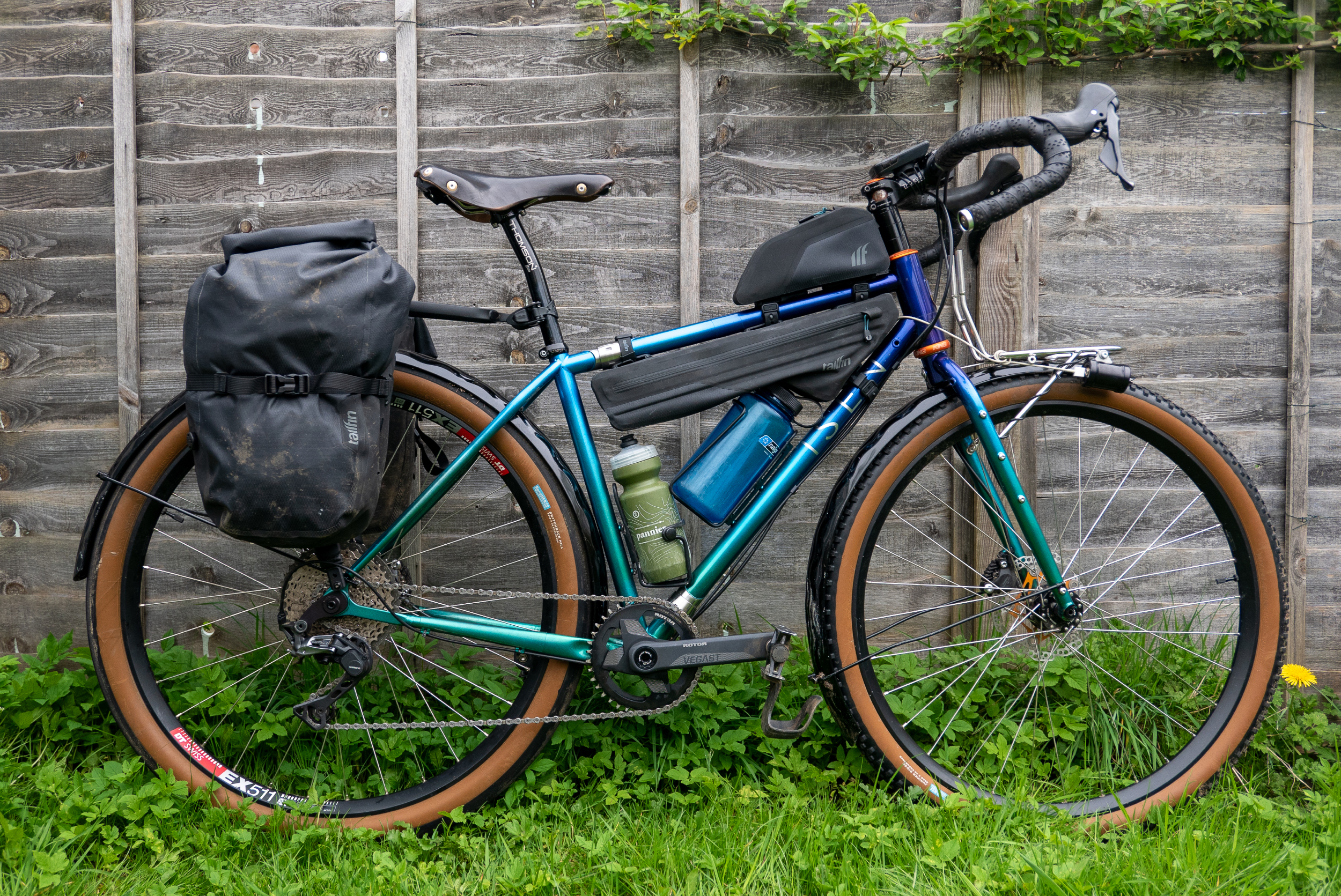
British company Tailfin is fast becoming a respected name in bikepacking circles, producing well engineered minimalist equipment, that balances durability and capability without major weight gains. Crucially their designs also should work with pretty much any bike, which is a major plus for the bikepacking curious.
Increasingly, Tailfin is creating its own ecosystem of bikepacking storage solutions, with new equipment interacting seamlessly with the old, which to my mind bears similarities to the approach of tech giant Apple.
There are positives and negatives to this from a consumer perspective. In terms of how the kit performs together it’s hard to think of anything other than fully bespoke luggage set ups which will give the same level of finesse and function. That however comes with a risk of feeling trapped into using one company for your luggage needs.
Leave those thoughts aside though, as we look at a round up of three of Tailfin’s most recent launches: Mini Panniers 16L, 3L Half Frame Bag and their Packing Cubes.
Tailfin Mini Panniers 16L: The Ride
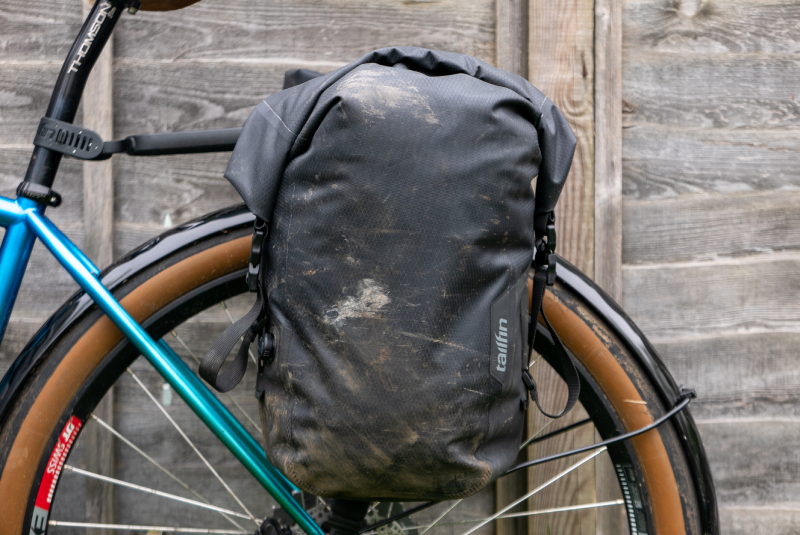
Panniers after a long period of neglect seem to be enjoying a resurgence in bikepacking circles. Tailfin’s latest is another step to making panniers great again.
Panniers make packing easier, particularly for riders who don’t have the space between rear wheel and saddle for large saddle / seatpost bags. My riding companion on one trip could only look on in envy as I effortlessly packed (including lightweight camp chair) while they struggled to squeeze their small bundle into a stuff sack lashed to their handlebars and seatpost bag.
The air valve certainly helps to take some of the sting out of the packing, but you could probably do without it, by giving your panniers a wee hug or squeeze as you close them.
Using these with Tailfin’s alloy rack was a real pleasure. The engagement of the clamp’s lever is truly satisfying (a bit sad to say). Pannier users will be familiar with the shake, rattle and hum of the bags on tarmac, but not these. It’s fit and forget: silent on rough stuff and a slim profile means undergrowth catching is minimal.
With the trunk bag, the lever was harder to engage, getting caught on the bag. That’s likely due to the angle I had the rack’s stays to avoid heel strike. Unless I was on a multi day remote trip or packing my deep winter camp gear, I’d go with either the trunk bag or panniers. Both is overkill and makes your bike rear heavy, and more difficult to handle on steep technical ascents.
Despite lugging a laptop along the North Downs Way or a full weekend’s camping kit I barely noticed the rear weight when riding – and I always pack to capacity!
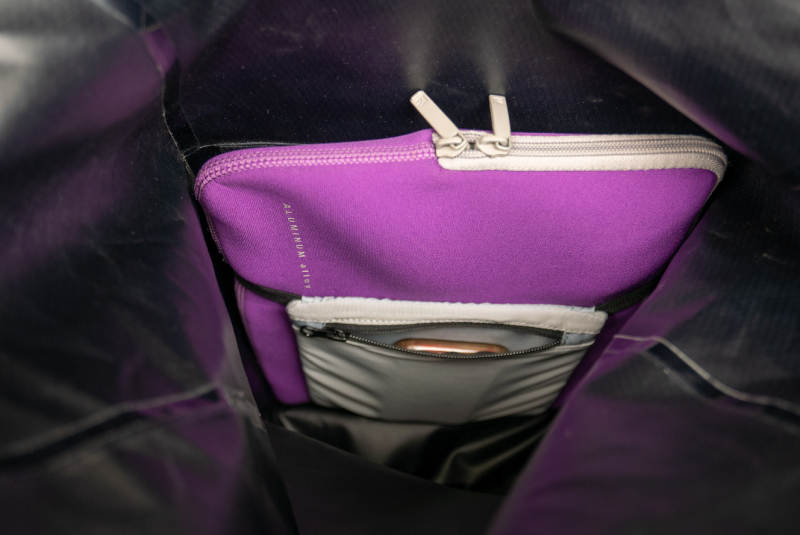
For commuters, the laptop inner is a worthy investment. It comfortably fitted my 13” screen in a padded case, raising it an inch above the ground minimising risk when placing on the ground. The inner is very easy to fit and remove with velcro fastenings and comes with a handy zipped compartment for cables – but will struggle with a large plug.
The compression straps can be used to compress the bag like a belt, or as a streamlined way of closing the bag. I tended to do the latter, meaning the “ladder” you could use to fix a rear light was unavailable. It would be nice to see a solution there, as lights on seat stays aren’t easily visible, and a seat post fitted light will only work if you’re not using the trunk bag.
My only other gripe – if you can call it that – is there is no handle like on conventional panniers to make it easier transporting it off the bike, such as at transport hubs, campsites, places of work etc. You can of course use the compression straps, or looped closure – it’s just not as convenient.
There’s some initial assembly to fit the hook and clamp at point of purchase. Nothing complicated as it’s just a few turns of the screw, but it was unexpected given how much they cost.
Tailfin Mini Panniers 16L: Spec
• Materials: Hypalon/Ripstop Nylon
• Weight (scales): 573g each including two compression straps / 709g incl laptop holster
• Dimensions at maximum: 440mm (H) x 260mm (W) x 120mm (D)
• Capacity: 16L
• Recommended load capacity: 4kg off-road / 8kg road
• Mounting: X-Clamp 6061 Alu Alloy; fixed hook for rack stay
• Closure: roll-top
• Standout features: rattle free; waterproof; slim profile; air valve
• Additional: 2 x compression straps; spacers to fit non-Tailfin racks
• Price: £100 per pannier + £20 including laptop holster (not including Tailfin rack £140 - £235)
Tailfin Frame Bag 3L: The Ride
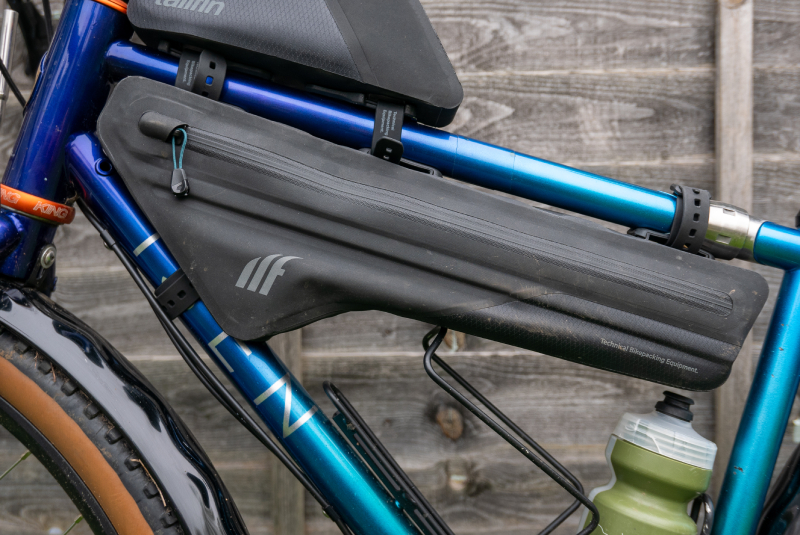
I wish I’d had that option to test out Tailfin’s frame measurers, (digital and analogue) as I’d have sized down to the 2.3L version.
The lower wedge of the bag was squished by my Nalgene water bottle on the downtube, resulting in a wee bit of knee rubbing when I was out of the saddle. That’s on me though, and I think if I’d chosen right I might well have had my first experience of a frame bag that didn’t catch on my shorts.
Despite these restrictions, I fitted a fair amount without straining the zip: a micro floor pump, tool roll, sealant, spare inner, snacks, binoculars, toothbrush and paste, and trowel. Aside from a head torch and neck warmer, that’s what I’d usually squeeze into my custom made full frame bag.
Of course, such packing was a bit like Jenga. The one time I needed my pump I found I had to remove pretty much everything – but c’est la vie with bikepacking.
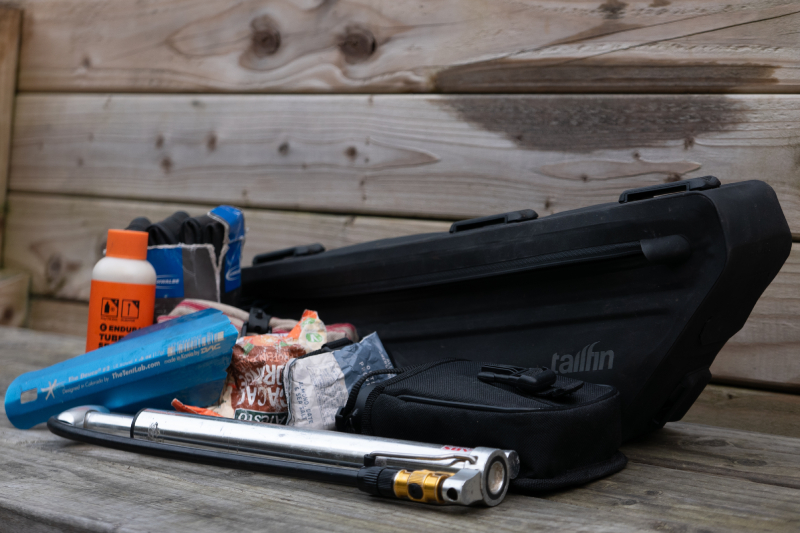
Riding through this wet winter and spring of ours, Tailfin’s assurance of waterproofness rings true. I even left my bike zip side up during a particularly heavy downpour overnight, and there was no ingress. Of course, a bag is only waterproof so long as you don’t open it in wet conditions...so for an on the go bag I’d always advise to pack kit that you assume will get wet eventually.
The zips are reportedly a custom sourced waterproof version, designed to hold under tension – which is pretty essential given how much framebags are abused in terms of their holding capacity.
The rigid structure provided by two carbon rods and secure fastening meant one handed unzipping and doing up on the go was possible. It’s the little things that count, and I also liked the way the zip heads tucked away into little pockets at the end as well.
My test bike, an Isen, has a pretty delicate paint job – leaving aside that not being ideal for an off-road centric bike – I was pleased when I removed the bag after a couple of long hours and days in the mud and grime of the Surrey Hills, that Tailfin’s assertion of reducing damaging to my bike’s finish held true.
Another neat touch is you can use the same two straps for the top tube bag to attach the frame bag, too.
Tailfin’s signature dark grey will suit many, but as anyone who knows me, I like colour. That absence and the boxy nature of the bag which overwhelmed my slender steel tubes meant I could never love this bag, but I definitely appreciated the attention to detail and robust construction.
Tailfin Frame Bag 3L: Spec
• Materials: 210D Hypalon/ 210D Ripstop Nylon body; internal carbon frame; custom sourced waterproof zip
• Style: Half frame bag
• Weight with straps (scales): 273g
• Dimensions: 440mm (L) x 140mm (D) x 64mm (W)
• Capacity: 3L
• Mounting: updated V-Mount system and TPU straps (included 1 x 290mm, 3 x 185mm straps)
• Standout features: Port for cables / hydration system; waterproof; internal pockets; rigid shape
• Price: £105
Tailfin has introduced nine sizes of frame bag to fit bikes from 47cm – 61cm, with a volume from 1.9L (£95) to a whopping 6.5L (£125). These are made in two styles: Half frame bag (six sizes: 2.3L, 3L, 3.8L, 4.5L, 5.3L, 6.5L) and Wedge (three sizes: 1.9L, 2.7L, 3.5L)
A welcome touch for those unsure what bag is best for you are both the digital and analogue means to measure your frame.
Tailfin Packing Cubes: In the field
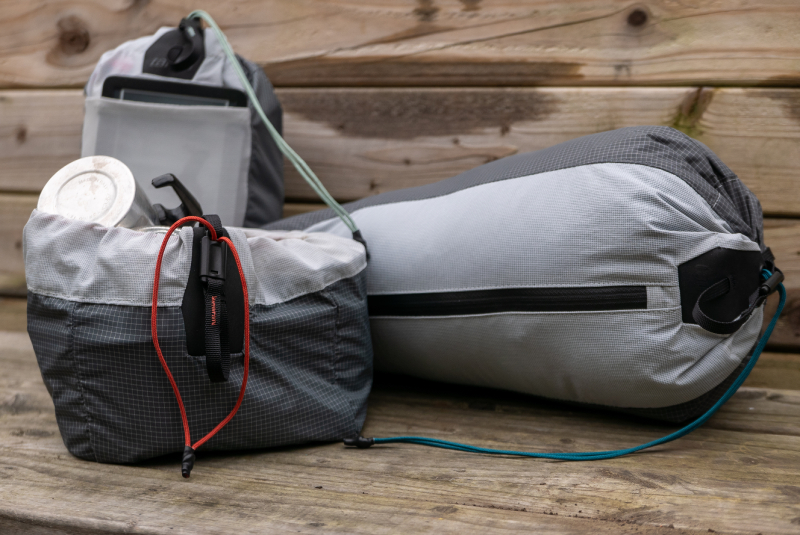
Before diving into in my experience with these bags, I should caveat I only trust my sleep system and spare clothes when camping in dry bags.
It doesn’t matter how waterproof the outer bag is. The risk of water ingress on a multi day trip and what it will mean for my post-ride experience is not worth it, while in adverse weather conditions it could well prove dangerous.
That might seem an extreme reaction, but try sleeping in a soaked down sleeping bag when the rain turns to snow and the wind is relentless. I did it once, got hyperthermia, and vowed never to repeat that experience again.
Of course, if you’re not planning on camping and your stays are indoors, then ignore the above!
These bags do as you’d expect and fit neatly into the Tailfin trunk bag.
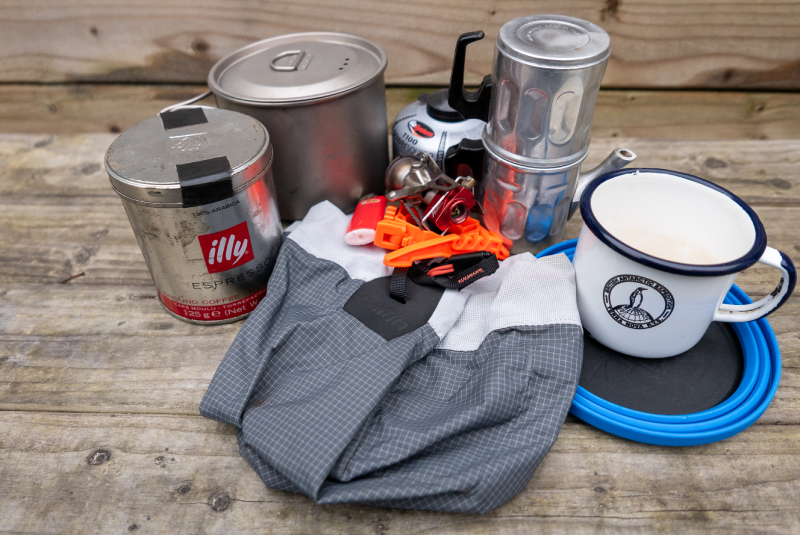
For testing purposes purely, I packed my Alpkit Pipedream 200 sleeping bag, silk liner and Klymit Insulated Static V Lite camping mat easily into the 6L bag, with a bit of room to spare. The 3.5L worked well for storing a selection of merino off-the-bike wear, with the outer pocket housing my Kindle.
I was impressed however by the capability of the 2.5L bucket bag (if also a little aghast at the £28 price tag). It’s great for keeping your cookware together in one place. I usually bundle everything into a cotton tote bag to keep things in one place, but the Packing Cube’s draw string means you can keep all your kit together, snug and secure.
Cooking pot (with stove and gas inside), coffee pot, coffee and mug fitted fine – the five inner pockets are handy for storing other necessities for campside cookery too eg lighter, tea bags etc. That does make for quite some bulk though of immovable objects, and in tight spaces, like most folk, you’ll probably try and fit everything differently so as to maximise your limited room anyway.
Conclusion and value
I’d always been Tailfin curious before reviewing this kit, and after a couple of months of hard use, I can definitely see the appeal.
Its simplicity and practicality speaks to high levels of quality. That’s backed up by their in-depth research and real life testing into making sure the kit works with no snags. I’ve a lot of respect for that, and aesthetics aside, would happily use their panniers and framebags on future adventures.
While the price is high, it compares well with other competitors. The panniers are only £5 more than their nearest competitor Ortlieb 14.5L Gravel Pack (540g https://www.ortlieb.com/uk_en/gravel-pack-ql31+F9986)– assuming you discount the £140 needed for the alloy rack. The frame bag is on par with the more bespoke and colourful Wizard Works Framebagracadabra (£93 - £110) and more prosaic Ortlieb Frame-pack TopTube (£110 – £120)
The Luggage Cubes however feel vastly overpriced, especially in comparison to what Alpkit offers (from £7.99) while depending on your trip dry bags from companies like Exped (from £13) will be much cheaper and more practical.
Given the bashing most bikepacking kit will go through, a five year warranty is very welcome. It’s also good to note the 30% discount in event of a crash for a like for like replacement.
The high cost will be off putting for many, as you can surely find cheaper solutions out there. But will those items be as durable and well designed? I think we all know the answer to that…







